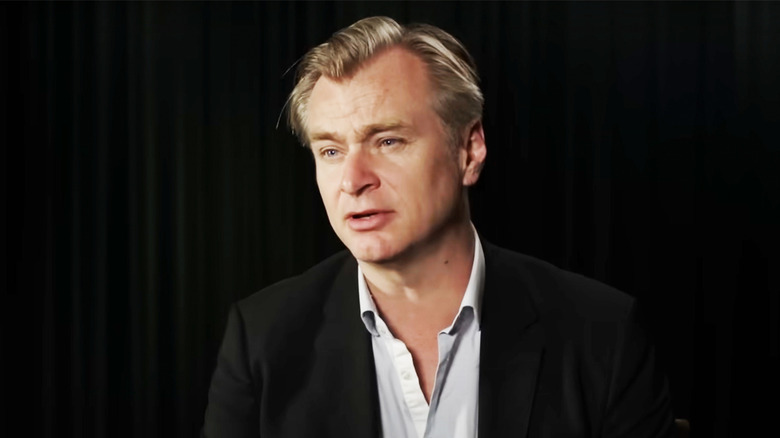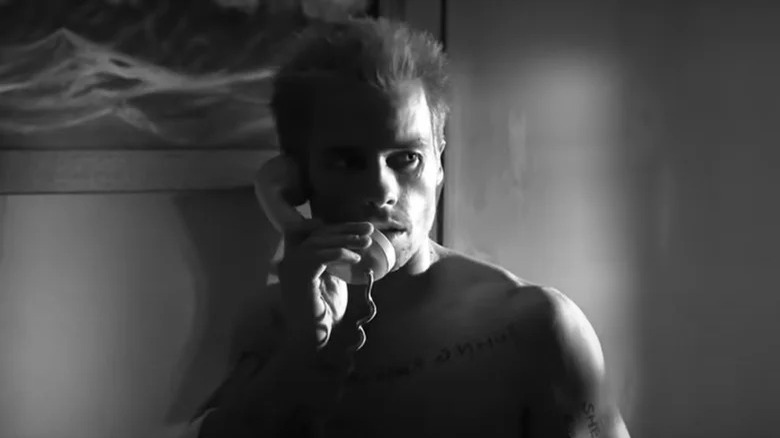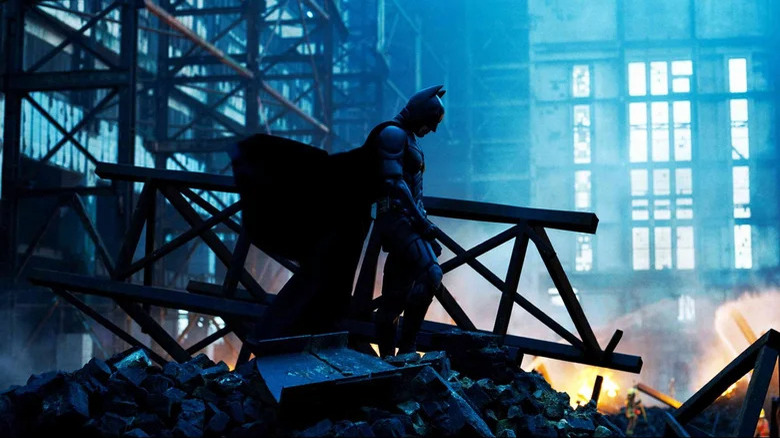Christopher Nolan's Best Movie, According To Rotten Tomatoes
Christopher Nolan is a walking refutation of the idea that we're all becoming troglodytes with attention spans the exact length of an Instagram reel. In 2023, the man put out a three-hour epic chronicling the life of the inventor of the atom bomb and we all lapped it up, propelling the box office take for "Oppenheimer" to almost a billion dollars. What's more, the British director has a penchant for writing mind-bending and complex screenplays to the extent that even veterans like Guy Pearce and Leonardo DiCaprio are confused by Nolan's scripts. He also confounded mass audiences, including Quentin Tarantino apparently, with "Tenet" back in 2020 — a feat he'd accomplished to much greater effect 10 years prior with "Inception."
In other words, in a world where we're all supposedly becoming less thoughtful and less able to focus than ever before, Christopher Nolan should not be as successful as he is. Yet, here he is in 2024 with multiple box office smashes to his name and now the first box office blockbuster in 20 years to win Best Picture.
In a career as illustrious as this, then, there are multiple contenders for Nolan's best film. Surely the world-conquering "Oppenheimer," which we at /Film dubbed one of the best of 2024, is in with a chance. But even discounting his latest blockbuster triumph, Nolan has the kind of filmography directors aspire to forge. Personally, I like my Nolan tempered by emotion and favor "Interstellar" and his Batman films over any of his other work. But often you'll find that even his most cerebral, narratively-complex movies are cited as his finest, with "Inception" frequently championed as such. In order to answer this once and for all, then, we must turn to that great arbiter of movie taste: Rotten Tomatoes.
Christopher Nolan's best film according to Rotten Tomatoes
Whether superhero film, sci-fi epic, or blockbuster biopic, Christopher Nolan films have always tried to challenge the audience, even if that's simply by virtue of existing as a three-hour historical drama in an age when Kevin Hart's "Lift" is topping the Netflix charts. But while "Tenet" might have befuddled the world in a way that wasn't quite conducive to box office success (that and it was hampered by the COVId-19 pandemic), Nolan's first studio feature was confusing in all the right ways.
2000's "Memento" was the first time Nolan had been handed a modest studio budget to bring his intricate, multi-layered ideas to the screen. The director had built some buzz after self-funding his debut film, "Following," which contained many of the hallmarks that we now associate with a Nolan movie, including the use of a non-linear narrative. For "Memento," however, the director took the same concept of a non-linearity and ran wild, introducing audiences to a film that plays both forward and backward at the same time. Essentially, the film sees Guy Pearce's Leonard Shelby attempt to piece together recent events in his life and solve the murder of his wife, all while suffering from a near debilitating case of anterograde amnesia.
According to Rotten Tomatoes' ranking of Nolan films, this mind-melter of a movie is the best thing the director has ever done. "Memento" currently holds a 94% critic rating on the site, and a 94% audience score. Now, hold on, I hear you say. "The Dark Knight" also has exactly the same scores. Yes, Nolan's 2008 sequel to "Batman Begins" does indeed match "Memento" when it comes to percentage scores, and here is where Rotten Tomatoes reveals itself to be just as confusing as any Nolan screenplay.
Rotten Tomatoes ratings are as mind-bending as Memento
As most will know, Rotten Tomatoes merely aggregates reviews for movies and TV shows, and through some opaque process decides whether each of those reviews is positive or negative, thereby flattening the difference between a glowing "this is a masterpiece" review and a more modest "this film is decent enough for a binge watch" take. The resulting percentage score represents what percentage of critics deemed the media in question to be good, or "fresh."
So, when it comes to "ranking" a director's work, it's not really a case of the site itself claiming a certain film to be a director's best, but a case of which film managed to get the highest percentage score after having been put through the RT wringer. Aside from the fact that none of this takes into account the fact that one movie might have 20 reviews and one might have 200, it also elides the aforementioned nuances that come with film and TV criticism.
In terms of "Memento," 186 reviews were aggregated and 94% of them were "positive." 50 of those reviews were from so-called Top-Critics, and 88% of those reviews were positive. For "The Dark Knight" — which even more than 15 years later is better than you remember — 347 reviews were aggregated, and 94% of those were positive — which is surely a bigger achievement. What's more, 94% of 74 Top Critics liked the movie. Even more confusing is the fact that the actual number rating for "Memento" (accessible by clicking on the percentage score itself) is 7.60, while "The Dark Knight" sits at 7.90. All of which should tell you that "The Dark Knight" was actually rated higher than "Memento" and that none of these ratings should be taken all that seriously to begin with.


